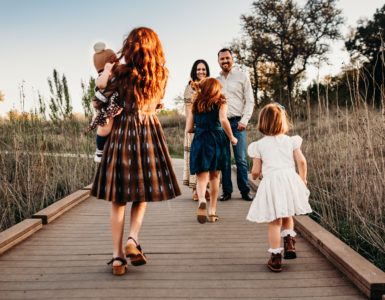Many parents, regardless of how their family is formed, are worried about having difficult and perhaps uncomfortable conversations with their children. Having a child who was adopted adds to this anxiety as most parents who chose adoption do not want to upset their child and/or may not have much information about their child’s birth parents. Here are some tips for how to address adoption questions (and anything else) with your adoptee.
Be Open and Honest from the Beginning
In my second-grade science class, we were assigned a project dealing with genetics. The premise was simple: there was a column titled “Dad,” a column titled “Mom,” and a column titled “Me.” The rows all had various characteristics. The purpose of the assignment was to illustrate heritable traits, such as hair color and eye color. Take my friend as an example: her mother is blonde, her father is a brunette, and she is blonde. Her chart looked so pretty as she always had the same color box as one of her parents.
My chart did not look as pretty. My mom’s hair is brown, my dad’s hair is blonde, and my hair is jet black. My mom’s eyes are blue, my dad’s eyes are hazel, and my eyes are dark brown. My mom’s skin is pale, my dad’s skin is pale, and my skin is tan. While my friends’ worksheets looked like beautiful gradients, my worksheet looked like a hodgepodge of random colors sprawled out on a blank page. Seven-year-old me who had always grasped school concepts easily went home after that lesson and had many questions for my parents.
As an international adoptee from China with Caucasian parents, my parents could not conceal the fact that I was not biologically related to them. That was one of the few adoption questions that were easily answered for me. However, many of us are familiar with the typical adoption plotline: parent adopts child as an infant and does not tell the child about their past until they grow up.
Iconic television character Phoebe Buffay from FRIENDS follows this exact premise. Spoiler alert: In Season 3, Episode 25, “The One At The Beach,” Phoebe visits an old friend of her late mother only to find out that the friend is actually her birth mother. Phoebe is angry and hurt after learning this and initially wants nothing to do with her birth mother. It being TV, Phoebe eventually bonds with her after getting over the shock. It makes sense that finding out something so major in such an abrupt fashion can be overwhelming.
Having age-appropriate conversations with your child from a young age helps them process the information in bits and pieces as they grow up. The key term here is “age-appropriate.” It would be difficult to explain the ins and outs of adoption to a two-year-old in the same manner that you would speak to a teenager. Similarly, you would not reveal to a six-year-old that their birth mother was a drug addict. Trust your instincts but my advice would be to introduce the topic to your child when they are younger and address more questions as they come up. It may be frustrating to receive so many tough questions, many of which you may not have the answer to. But I can assure you it is also really frustrating to be on the flip side with absolutely no explanation as to why you have certain physical characteristics or what health conditions you may be predisposed to.
Along these lines, try not to pull away from tough adoption questions. Children are abrupt and they usually do not know politically correct terms such as “birth parent” or “placed for adoption” and the words may come out more like “real parent” (this one may sting a little) and “given away.” Remember that your child does not mean these terms maliciously. Model the language you would like your child to use and they will usually adopt the language they hear you use. If you want, you could kindly correct your child but try not to reprimand them for using the wrong terms. This may create the association of talking about adoption leads to an upset parent.
Bottom line: Do not hide the fact that your child was adopted from them until they are adults. This never ends well.
Listen
This one seems pretty obvious but it is worth mentioning. Children desire to feel heard and understood, especially teenagers. When your child tells you that they feel sad because they do not understand why their birth parents would place them for adoption, they are sharing a vulnerable part of them with you. Most of the time, they do not want a “solution;” they just want an ear to listen and a shoulder to cry on. This was especially true for me. I cannot speak for all adoptees but I processed everything on my own. No matter how supportive my friends and family were, it was ultimately me who needed to decide how to think and feel about it all. So, when I did open up to others, I did not want them to help me come up with solutions or pity me either. Not all adoption “questions” have answers. I just wanted someone to bounce my ideas off of and tell me I was not crazy for thinking the way I did.
Active listening is always a good tool to use. To make sure your child really feels heard, you can clarify by repeating back what they said to them and making sure you understood their point correctly.
Validate their Emotions
Sometimes children don’t ask adoption questions; sometimes they just need to express their emotional needs. As mentioned in the last point, children want to feel heard. The Gazette recently interviewed Stephanie Neff, the supervisor of wellness and community partnerships for the Cedar Rapids Community School District. In this interview, she declared, “The most important way to support kids is to listen without distractions and respond without judgment or trying to ‘fix’ their problems.” The latter part of this statement is so important: Respond without judgment or trying to ‘fix’ their problems. It may be disheartening to hear your child say they feel unloved or insignificant but remember, this is usually not a reflection on you as a parent.
One of the worst conversations I have ever had about adoption took place when I was a teenager. I was still searching for my identity and being adopted added a whole other layer of questions I had about who I was and how I wanted to be perceived. There were a few months where I struggled a lot with feelings of inauthenticity and insecurity. I did not want too many people to know that the source of these feelings stemmed from my past. When I finally got the courage to share, they responded, “You have food on your plate and a roof over your head. I don’t understand why you’re complaining.” She was right; I did have my basic necessities covered which already made me more fortunate than many. But thanks to this response, I did not open up to anybody else for months. Dismissing someone’s emotions can be detrimental to their mental health. Not only is the dismisser invalidating the person’s emotions, but they also make the sharer feel more alienated.
When someone validates my emotions, they tell me they understand where I am coming from and accept my anxiety or sadness as a normal human feeling. When someone dismisses my emotions, as this girl did, they are doing exactly the opposite. Would I tell that girl something vulnerable and personal tomorrow? Heck, no. However, the stakes are higher when it is your child. Most parents want healthy communication between them and their child. Invalidating your child’s emotions and dismissing their feelings will only make them feel worse which will result in them telling you less – which is exactly what you don’t want.
The Child Mind Institute published the article “Helping Kids Deal With Big Emotions” in which the author poignantly states: “Just make sure if your child tells you that she’s feeling sad, or anxious, or angry, you don’t immediately try to talk her out of it. Sometimes hearing ‘Oh, it isn’t that bad!’ can make kids feel like their emotions are wrong and inadvertently teach them that they shouldn’t share how they are feeling. Instead, you can validate the emotion (‘Yes, that does sound frustrating’ or ‘You do look disappointed’) and then encourage healthy ways of dealing with that feeling.” For me, processing my past brought up many strong feelings, including confusion, anger, sadness, loneliness, fear, and insecurity.
After years of researching, I have learned these are normal feelings that many experience throughout adolescence. Understanding these emotions are common and helping your child find healthy ways to express and overcome negative feelings encourages emotional growth. Furthermore, by validating their emotions, your child is more likely to view you as someone they can trust and be vulnerable with. It is not uncommon for adoptees to have trust issues as they have already experienced a major loss (usually at an extremely young age). By validating their emotions, you create a safe space for them and show them that you are on their side.
Keep the Focus on your Adoptee
Speaking from experience, one of the worst feelings is being dismissed. We have all been there. There have been numerous times when I have opened up to people about my adoption and the conversation would go something like this:
Me: “Yes, I am adopted from China. It’s such a gift. But there have been times in my life where I have felt very sad and misunderstood.”
Them: “Yeah, but imagine how hard it must have been for your parents. They had to go through all the paperwork and fly to China to get you.”
Too often, adults and even peers have told me how I should feel about being adopted. Of course, I appreciate people’s input and it would not be a conversation if it were one-sided. However, when I am telling you about my experiences and my feelings, I do not want a lecture. I just want a sympathetic ear. Emotions are complex; I can be upset and confused while simultaneously being appreciative and content. Again, not all adoption “questions” have answers.
Obviously, conversations with the adults I have met throughout my life are different than a conversation between parents and their children. However, the sentiment still rings true: if someone is talking about themselves and their feelings, do not steer the conversation towards yourself. Here is an example of what I am talking about:
Child: “It makes me sad that my birth parent would surrender me.”
Parent: “I’m sorry, I have always tried to love you the best I could.”
Realize that when many adoptees are trying to convey their feelings of abandonment or confusion, it usually has nothing to do with you as a parent. If someone is grieving the loss of a loved one and expresses their sadness to you, you would not respond with “I’m alive – am I not good enough for you?” These are separate situations and one can feel sad or confused about a past event while also feeling satisfied with their life in general. Let them be curious and ask their adoption questions.
Take this conversation from Season 1, Episode 3 of Gilmore Girls, “Kill Me Now.” If you are a Gilmore Girls fan, you probably know Lorelai’s mother, Emily, to be a bit narcissistic and judgmental. In this scene, Lorelai is trying to stop Emily from forcing her daughter, Rory, to hang out with her grandfather (Emily’s husband, Lorelai’s father). Lorelai, exasperated, exclaims, “I’m not trying to hurt your feelings, Mom! Believe it or not, this is not about you.” Emily responds, “Of course it’s about me. If Rory goes and has a good time without you, then I win.” This is a more obvious example of a mother (in this case, blessedly fictional) taking her daughter’s issue and making it about herself. As a human being, you’re entitled to have and share your feelings, but the best time would not be when your child is trying to share something personal with you.
Ultimately, you know your child best and you should trust your instincts. Children, biological or adopted, tend to ask a lot of questions as they search for their identities. In hindsight, I feel like my parents did a really good job of answering my adoption questions even though they had very little information about my past. Everyone has an origin story and it is human nature to want knowledge of our pasts. Just because your child is curious about their beginning doesn’t mean they aren’t grateful and happy with their present life. Communication and trust are so personal and children, like everyone else, just want to feel loved, heard, and accepted.




